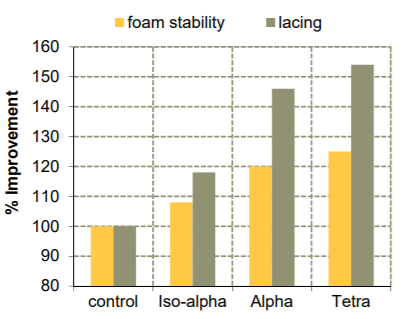Knowde Enhanced TDS
Identification & Functionality
- Flavor
- Flavor Ingredient Class
- Food Ingredients Functions
- Technologies
- Product Families
Features & Benefits
- Labeling Claims
- Product Highlights
- Tetra Iso-Extract (Tetra) is a pure, aqueous solution of the potassium salts of tetrahydro iso-alpha acids derived exclusively from CO2 extract.
- Tetra greatly enhances beer foam when used as a post-fermentation replacement for a portion of conventional bittering products.
- Tetra provides protection against lightstruck flavor when used as the sole source for bitterness or in combination with other light stable hop products.
The effects of 3 mg/l of pure hop acids on foam and lacing –a product comparison

- Product Information
- Appearance
Tetra is a homogeneous, clear aqueous solution that is amber in color. It is free- flowing at the recommended storage and application temperatures. Tetra is miscible in demineralized water and alcohol.
- Utilization
Based on HPLC analysis of the finished beer, utilization of Tetra is 60 – 80 %, depending on the timing and efficiency of the addition.
Actual utilization will vary from brewery to brewery due to differences in equipment and process conditions.
• Light Stability
Tetra only provides protection against lightstruck flavor in the complete absence of alpha acids and iso-alpha acids. Tetra can be used in conjunction with any Hopsteiner® light stable product to achieve light stability.
• Foam Enhancement
Tetra enhances both foam retention and cling. Noticeable foam improvement in beer can be achieved by adding 3 mg/l of tetrahydro iso-alpha acids.
• Flavor
Tetra provides 1.0 to 1.3 times the sensory bitterness compared to that achieved with conventional hop products. The actual intensity of bitterness depends primarily on the quantity of bittering units and the type of beer. Therefore, the target number of bittering units must be determined in preliminary tests in order to achieve the correct level of sensory bitterness.
• Quality
All Hopsteiner® products are processed in facilities which fulfill internationally recognized quality standards
Applications & Uses
- Markets
- Applications
- Food & Nutrition Applications
- Product Use
Tetra is typically used as a post- fermentation addition and prior to the final step in filtration.
• Dosage
Dosage is based on the product concentration, an estimated or known utilization and the desired intensity of bitterness in the beer. The fact that the perceived bitterness of Tetra is about 1.0 to
1.3 times the bitterness of iso-alpha acids derived from conventional hop products must be taken into consideration. The correct dosage of Tetra must be determined through trials at the brewery.
• Addition
We recommend adding Tetra at full strength (undiluted) into the center of the beer stream for at least 70 % of the total volume being transferred. An accurate, high pressure dosing pump is required to add the product into the beer stream at a point where vigorous mixing is assured. Tetra can be added at ambient temperatures If dilution is necessary, always add Tetra to demineralized water and adjust the pH to 10– 11 using potassium hydroxide (KOH).If containers are used over several days, it is recommended that the headspace be flushed with nitrogen (CO2 is not suitable).
• Cleaning Recommendation
Tetra should not be left in dosing lines at low temperatures. Lines and dosing pumps should be flushed with warm, slightly alkaline, demineralized water or ethanol for purposes of cleaning.
• For Light Stable Beer
For maximum protection against lightstruck flavor, it is essential that no other sources of non-reduced iso-alpha acids are inadvertently introduced into the wort or beer. Therefore, the following must be carefully implemented:
-
- exclusive use of light stable hop products
throughout the entire process
-
- avoid contamination through equipment surfaces previously in contact with regular iso-alpha acids
- never pitch wort with yeast that has been in contact with regular alpha and iso- alpha acids
-
Properties
- Physical Form
- Typical Properties
| Value | Units | Test Method / Conditions | |
| Concentration of tetrahydro iso-alpha acids by HPLC | 9.0-0.5 | %(w/w) | — |
| Concentration by UV spectrophotometric analysis | 10.0-0.5 | %(w/w) | — |
| Iso-Alpha acids | below detection limit | — | — |
| Alpha acids | below detection limit | — | — |
| pH | 8.5 - 10.5 | — | — |
| Viscosity at 20 °C (68 °F) | 2 – 6 | mPas | — |
| Density at 20 °C (68 °F) | 1.017 (± 0.005) | g/ml | — |
Regulatory & Compliance
- Certifications & Compliance
Technical Details & Test Data
- Analytical Methods
- Concentration of Bitter Substances The concentration of tetrahydro iso-alpha acids can be measured using the following
methods:
-
- HPLC according to Analytica-EBC 7.9 with the current ICS standards
- UV spectrophotometric analysis
• Concentrations of Reduced Iso-Alpha Acids in Beer
The concentration of reduced iso-alpha acids in beer can be measured by HPLC according to Analytica-EBC 9.47.
Note:It is possible that analysis results for the corresponding value for bitterness must be adjusted. The factor used in this analysis will result in lower values if reduced hop products were used as the exclusive source for bitterness or in higher amounts.
• Foam Stability and Cling Test
Foam stability can be measured using the following methods listed in MEBAK, ASBC or Analytica-EBC:
- NIBEMT Meter
- NIBEM Cling
- Steinfurth Foam Stability Tester
- Ross & Clark
- Pour Test
- Technical Support
We are pleased to offer assistance and advice on the full range of Hopsteiner® products:
- copies of all relevant analytical procedures
- Safety Data Sheets (SDS)
- assistance with pilot or full-scale brewing trials
- special analytical services
Disclaimer: The information provided in this document is believed to be correct and valid.However, Hopsteiner® does not guarantee that the information provided here is complete or accurate and thus assumes no liability for any consequences resulting from its application.
Safety & Health
- Safety
Tetra is a slightly alkaline, intensely bitter product and may be safely handled using routine precautions to avoid contact with skin and, in particular, the eyes. Any product coming into contact with the skin should be washed off immediately with soap and water or an appropriate hand cleanser. If Tetra gets into the eyes, flush with copious amounts of water until clear and seek medical attention.For full safety information, please refer to the relevant Hopsteiner® safety data sheet.
Packaging & Availability
- Packaging
Tetra is normally packaged in 20 kg pails. 10 kg jugs are also available.
Storage & Handling
- Storage
Tetra should be stored in sealed containers at 5 – 15 °C (41 – 59 °F). Avoid exposure to sunlight. Opened containers should be used within a few days.
• Best Before Date
Tetra is stable two years from the date it was produced / packaged if stored under the recommended conditions.

